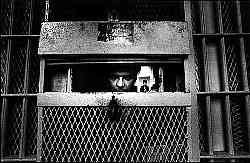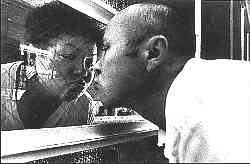|

NO
to the
death penalty
Support
the Moratorium
Freedom
for
the prisoners
How
to help
|
|
Receiving a letter pleases everyone. |
|
"...I�m a 46-year-old black man on death row in California. I�m looking for someone to write to, I�m not in touch with my family anymore..."
(Andre,
California)
"...Geographical distance is not a problem for me. I do believe that kindness and friendship may go beyond time and space..."
(Efren,
Arizona)
"I�m happy you wrote, I thought nobody cared about my life anymore ..."
(Darwin,
Oklahoma) |
|
Receiving a letter pleases everyone. This is even more the case when it may mean the chance of establishing a long-lasting and sincere friendship or when it comes to break complete isolation.
A letter has always an enormous value for prisoners. It means getting in touch with the outside world. As a matter of fact letters, even if they are often censored, are the only free space in the life of men and women on death rows. Receiving mail is a bit like opening the bars. Having someone to write breaks the monotony of everyday life, making room for emotions and helping not to lose faith in oneself.
|

|
Finding a friend who writes you is like finding a treasure. |
|
This �paper-made� friendship is simple but practical: photographs, news and above all words that show interest, respect, affection. Letters are one of the few means of establishing a human relation for a prisoner. Letters help those sentenced to death not to feel forgotten and they help to recover faith with oneself and with the
world: |
|
"Dear Mauro, my first day on the death row was like living my life over again. I was sitting in a room and it was as if there were two people: one good, the other evil... Since you�ve started writing to me, I am at peace with my mind..."
(Frank, Arizona) |
|
When you are letting yourself down because of loneliness and discouragement, receiving a letter means finding reasons to struggle. When you are restless, finding someone who writes and remembers you is like finding a treasure:
|
|
"
...today I'm filled with exuberance. Your letter assuaged me of my melancholy. I can only ruminate that you will keep in touch more often..."
(Desmond, Texas
executed on November 16, 1999) |
The letters of the prisoners are filled with gratitude and kind expressions. When we read them, we can understand how they have been looking forward to receiving them and what it means to get mail to those who are in prison. The different �emotional weight� between the two persons writing needs to be dealt with a great attention and delicacy: when one lives in an enclosed world or in isolation the meaning of words may become inconceivably weighty, an unfulfilled promise may lead to despair, a delay in replying makes one be plunged into a deep gloom again: |
|
"...because I didn�t receive your letter, I thought you did not trust me any more..."
(Eddie, Texas) |

|
Sometimes letters are the only link with the outside world. |
|
When you feel other people think you are trash, you find it hard to believe that there is someone willing to become a friend of yours. |
|
"... I deeply thank you for your letter and your good heart. We are usually seen just as criminals and nobody is able or wants to look at our soul. But deep inside soul we are not so bad... the soul yearns for good things..."
(Sasha, Siberia) |
|
Correspondence is the only invaluable resource we have so that these men and women won�t be forgotten. For those who are close to the execution, friendship is the only consolation and strength in the last years of their life. |
|
"... My dearest friend, when you will get this letter I will not be in this word anymore but this is OK because I will go to a better place where pain and suffering do not exist. Please don�t be sad. I have been very lucky to be blessed with so much friendship in my journey towards heaven..."
(Joe Mario Trevino, Texas,
executed on August 18, 1999)
|
|
Life conditions: poverty and loneliness. |
|
Life conditions on death rows are extremely difficult. Most of the prisoners have a very tragic story to tell: they immigrants or alcohol or drug addicted. There are also people who used to live on the street before going to prison. A lot of the prisoners were illiterate and learnt how to write and read in prison with the help of their inmates.
Poverty and deprivation preclude the possibility for prisoners to pay for a good defence but also to get:
"...the simplest things such as cigarettes, or the most necessary ones such as paper, or clean envelopes to be able to write and without which it becomes difficult to survive...".
(Steve
Roach, Virginia, eexecuted on January 13, 2000)
|
|
A big number do not get any help because they either haven�t got family ties or they have lost them.
"...I have been here for a long time now and I have never got a visit �try to think what it means to be shut here for all this time without seeing your family! It is such a long period of time...".
(Robert,
Trinidad e Tobago)
|
|
On top of isolation and loneliness, you have to add the humiliations prisoners suffer:
"... We wake up at four o�clock in the morning for breakfast and we have lunch at 10:30. On Mondays and Wednesday we can go out in the courtyard and this means 4 hours of exercises per week ... after all it�s a prison and the guards do their best to remind me that I am a prisoner on death row.�.
(Christian,
California)
|
|
Almost everybody spends 23 hours a day in a cell.
"Days pass by always in the same way and nothing makes one different from the other, the only difference is their names and the month. They just pass by as if they were a single, useless, endless day..."
(Vladimir,
Siberia)
|
|
